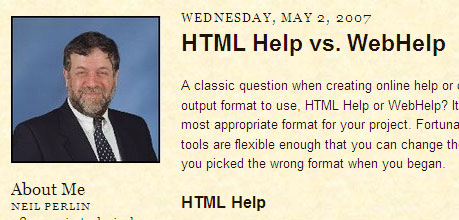Creating Help in the Web 2.0 Age — Presentation by Neil Perlin
Listen here:
This is a presentation titled "Creating Help in the Web 2.0 Age" that Neil Perlin gave to the Suncoast Chapter in Tampa, Florida in February 2007. Neil talks about what Web 2.0 is, and how help can be delivered on the fly according to specific user requests. This is a bit of a long file -- perfect to listen to on your way to the STC Conference. By the way, check out Neil's new blog.
Here's a more formal description of the presentation that Neil wrote: For years, technical communicators have created help on a mass industrial model – one finished help system for all users. But two technologies, XML and Web 2.0, offer ways to change that model, letting us create just-in-time help personalized to specific users' needs, with content written by users themselves. How does this work?
In the case of XML, a feature in a specific authoring tool, Flare, lets us automatically create help systems that reflect the needs of specific sets of users, possibly even specific users, when those users request help. In the case of Web 2.0, we get the flexibility to let end users write content themselves, taking some of the load off technical communicators.
This all sounds futuristic and idealistic, but the automatic Flare output has already been done on a test basis, and user-contributed content is all around us – in wikis, for example.
This presentation discusses the philosophy and technologies behind these two new approaches to creating help. It illustrates the specific place in Flare that lets us create automatic, just-in-time output. It then looks at the philosophies, technologies, and implementations of user-contributed content.
About Neil Perlin
From the STC site: “Neil Perlin has twenty-eight years' experience in technical communication, with twenty-two in training, consulting, and development for various types of online formats and tools including WinHelp, HTML Help, CE Help, JavaHelp, RoboHelp, ForeHelp, Flare, and some now largely forgotten. Neil is a columnist and frequent speaker for STC and other professional groups, a member of the Boston Chapter STC, the creator and manager of the Beyond the Bleeding Edge stem at STC's annual conference, and an STC Associate Fellow.
Neil is a Madcap Certified Instructor for Flare, and an Adobe Certified Instructor for RoboHelp and Captivate. He provides training, consulting, and development for online help and documentation, Flare, RoboHelp, Captivate, XML, and single-sourcing through Hyper/Word Services of Tewksbury, Massachusetts. He can be reached at [email protected] or via www.hyperword.com.”
- To contact Neil, send an e-mail to [email protected].
- Visit Neil's blog at http://www.hyperword.blogspot.com/.
- You can learn more about Neil's consulting services at http://hyperword.com.
About Tech Writer Voices
Tech Writer Voices is a podcast for technical writers, technical communicators, and help authors who may call themselves different names — content managers, information architects, information designers, documentation specialists, or knowledge transfer agents. We play both chapter recordings and interviews on at least a weekly basis. You can listen to these podcasts directly on the website, or download them to your MP3 player, such as an iPod, iRiver, Creative Zen, or other. Tech Writer Voices will be at the STC Conference in Minneapolis — be sure to say hello.
- To submit feedback to Tech Writer Voices, send an e-mail to [email protected] or comment below.
About Tom Johnson

I'm an API technical writer based in the Seattle area. On this blog, I write about topics related to technical writing and communication — such as software documentation, API documentation, AI, information architecture, content strategy, writing processes, plain language, tech comm careers, and more. Check out my API documentation course if you're looking for more info about documenting APIs. Or see my posts on AI and AI course section for more on the latest in AI and tech comm.
If you're a technical writer and want to keep on top of the latest trends in the tech comm, be sure to subscribe to email updates below. You can also learn more about me or contact me. Finally, note that the opinions I express on my blog are my own points of view, not that of my employer.




